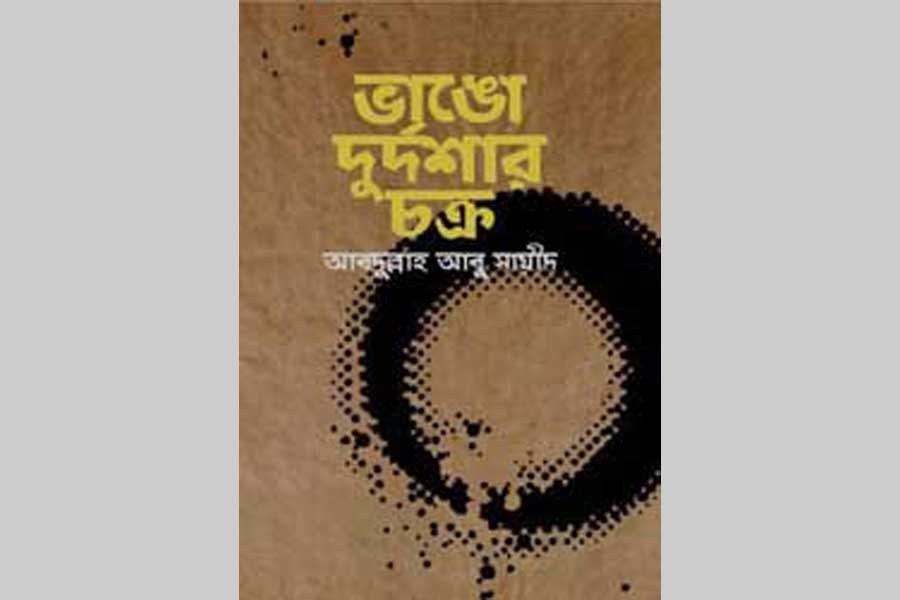Professor Abdullah Abu Sayeed is an insightful writer, popular teacher, former television presenter, leading social activist and a successful organiser in the present Bangladesh. He has dedicated his almost entire life to making Bengali literature popular to the young people of the country. A pioneer in popularising 'reading habit' among the children and youths, Abdullah Abu Sayeed is also well known for his eloquent speeches. His is gifted with a sharp sense of humour. Moreover, his optimistic and positive attitude towards life and the universe is always a great source of inspiration for the new generations aimed at helping them overcome different barriers. In the book 'Bhango Durdoshar Chakro'(Break the Rings of Ordeal), Abdullah Abu Sayeed attempts to provide his readers with the invaluable tools to break the pockets of negativity and utilise their full potential.
The book is mainly a collection of 10 talks on various life-oriented topics as well as social issues (i.e. fear, failing, ageing, negativity, positive attitude, inner power, enlightened life, voluntary blood donation, working for people and community etc.). Those were delivered by the author during the last one and half decades on various occasions of Quantum Foundation.
It also contains two exclusive interviews of Professor Sayeed where he talks about diverse chapters of his life including the days at university, the literary movement of the 1960s, experiences of Bishwo Sahittyo Kendro (World Literature Centre) and other organisations, and so on.
We have dreams regarding our life, yet they at times may prove elusive. We might know what to do and even how to do something, but swinging into action requires courage as well as the ability to conquer fears, bear with humiliation, and discomfort. We are habituated from childhood to avoid unpleasant feelings. The author shows us how to identify and remove obstacles that prevent us from reaching our full potential and fulfilling our dreams. Our mind is always obsessed with the fear of failures. But failures can be seen as lessons that will only allow us to get better if we learn from our mistakes. Abdullah Abu Sayeed gives an example: "When a car goes up a hill, we can say symbolically that it is progressing. But when it descends, do we say it's going backwards? No, because the wheels are still going forward. The car comes down, so it can go up another hill."
Unlocking our full potential is a lifelong process. Hence, one of the most important steps we can take towards achieving our greatest potential in life is to learn to monitor our attitude and its impact on our work performance, relationships and everyone around us. Professor Sayeed talks about both 'negative' and 'positive' attitudes. He mentions 'negativity' or 'negative attitude' as a 'fallacy' which can have a strong and sometimes devastating impact on all aspects of our life. Negativity drains us of our energy and keeps us from being in the present moment. The more we give in to our negative thoughts, the stronger they become. On the contrary, a positive attitude helps us cope more easily with the daily affairs of life. With a positive attitude, the author believes, we see the bright sides of life, become optimistic, work for the betterment of society, and expect the best to happen.
Abdullah Abu Sayeed's dedication in evoking the youths' passion for reading books led him to found the "Bishwo Shahittyo Kendro" in 1978. Needless to say, through this centre the professor has contributed immensely to create an enlightened generation. But as a social activist he is very much aware that in an era of rapid moral degradation and social unrest, many of our young people are passing through a critical situation. Due to lack of confidence and frustration, they have forgotten to realise their full potential. Abdullah Abu Sayeed's book 'Bhango Durdoshar Chakro'(Break the Rings of Ordeal) whets the quest of youths for awakening their inner power to break the self-created barriers in order to reach their full potential. The book deserves wide readership.
S.M. Rayhanul Islam is an independent researcher.


